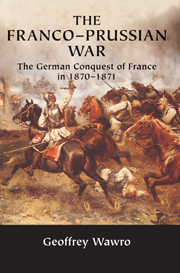Book contents
- Frontmatter
- Contents
- List of Abbreviations
- List of Illustrations
- Acknowledgments
- Introduction
- 1 Causes of the Franco-Prussian War
- 2 The Armies in 1870
- 3 Mobilization for War
- 4 Wissembourg and Spicheren
- 5 Froeschwiller
- 6 Mars-la-Tour
- 7 Gravelotte
- 8 The Road to Sedan
- 9 Sedan
- 10 France on the Brink
- 11 France Falls
- 12 The Peace
- Bibliography
- Index
Introduction
Published online by Cambridge University Press: 20 July 2009
- Frontmatter
- Contents
- List of Abbreviations
- List of Illustrations
- Acknowledgments
- Introduction
- 1 Causes of the Franco-Prussian War
- 2 The Armies in 1870
- 3 Mobilization for War
- 4 Wissembourg and Spicheren
- 5 Froeschwiller
- 6 Mars-la-Tour
- 7 Gravelotte
- 8 The Road to Sedan
- 9 Sedan
- 10 France on the Brink
- 11 France Falls
- 12 The Peace
- Bibliography
- Index
Summary
There were two Prussias in 1870. One was described by Theodor Fontane in Rambles through the Brandenburg March, a rambling four-volume travel book that depicted a savage Prussia still emerging from its swamps and forests. “Do not expect the comforts of the Grand Tour,” Fontane chuckled in the first volume, but “poverty, squalor and … no modern culture.” Trains were still a luxury in this industrializing kingdom of coal and iron; they plied only between the big cities and towns. For travel between Prussian villages, hired traps were needed, but they were invariably driven by resentful provincials, who would drive you round in circles, in and out of woods and streams, and end up charging you more for a short ride between neighboring hamlets than you would pay on the railway for the five-hour trip from Berlin to Dresden. Prussia in 1870 was still a “virginal wilderness,” a land of bogs and pines that ran right up to the gates of Berlin itself. It was a rough country with rough manners. The Viennese – always condescending where the Prussians were concerned – derided their northern cousins as having “two legs rooted in the Bible, two in the soil.” The Prussians could be knuckle-dragging, evangelical philistines, a conclusion that even a great patriot like Theodor Fontane was at pains to avoid.
The other Prussia was described by Karl Marx in the 1860s. Berlin, with its splendid Baroque palaces and Le Nôtre gardens, was a graceful, expanding city.
- Type
- Chapter
- Information
- The Franco-Prussian WarThe German Conquest of France in 1870–1871, pp. 1 - 15Publisher: Cambridge University PressPrint publication year: 2003

